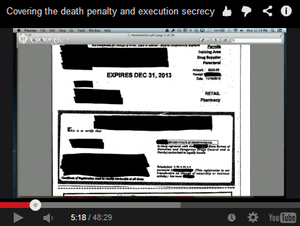How to break through the secrecy surrounding the death penalty
 Journalists from four states recently joined IRE to discuss coverage of the death penalty and execution secrecy. Ziva Branstetter, Chris McDaniel, Brian Haas and Della Hasselle shared reporting tips, story ideas and more during the 45-minute Google+ Hangout.
Journalists from four states recently joined IRE to discuss coverage of the death penalty and execution secrecy. Ziva Branstetter, Chris McDaniel, Brian Haas and Della Hasselle shared reporting tips, story ideas and more during the 45-minute Google+ Hangout.
Here are four tips from the chat:
- When you look into lethal injection practices, don’t stop at the drug name. It’s also worth checking on how much of that drug gets administered, said Della Hasselle, a contributor to The Lens in New Orleans. In Louisiana, for instance, execution protocols call for 10 milligrams of midazolam. The same drug was used in the botched execution of Oklahoma inmate Clayton Lockett, Hasselle said. In that case, however, state policies called for 100 milligrams of the drug – 10 times as much as Louisiana. Florida uses 500 milligrams, Hasselle said.
- When you’re working with heavily-redacted documents, sometimes it’s worth re-submitting records request as a method of checking your work. Chris McDaniel of St. Louis Public Radio thought he had identified a document as a state license for a pharmacy supplying lethal injection drugs to Missouri. So he filed another open-records request, this time for the specific license, to see if the document he received matched the one he already had.
- Even if your state isn’t actively setting execution dates, there are still plenty of issues to look into, said Brian Haas, a reporter at The Tennessean. Many death row inmates die of natural causes, he said. That raises a host of issues for journalists to explore. What is the cost of feeding and providing medical care for those spending their lives in prison? Reporters can also look into innocence cases, Haas said.
- Never assume you can’t get information, said Ziva Branstetter, enterprise editor at the Tulsa World. Oklahoma passed a secrecy law that prevents people from knowing who made and sold lethal injection drugs and who inserted an IV. It also makes secret the qualifications of those in the execution room. Still, journalists have been able to unearth key pieces of identifying information (including names of doctors and pharmacies) through records request, legal documents and other paperwork.
Watch the entire chat here.
